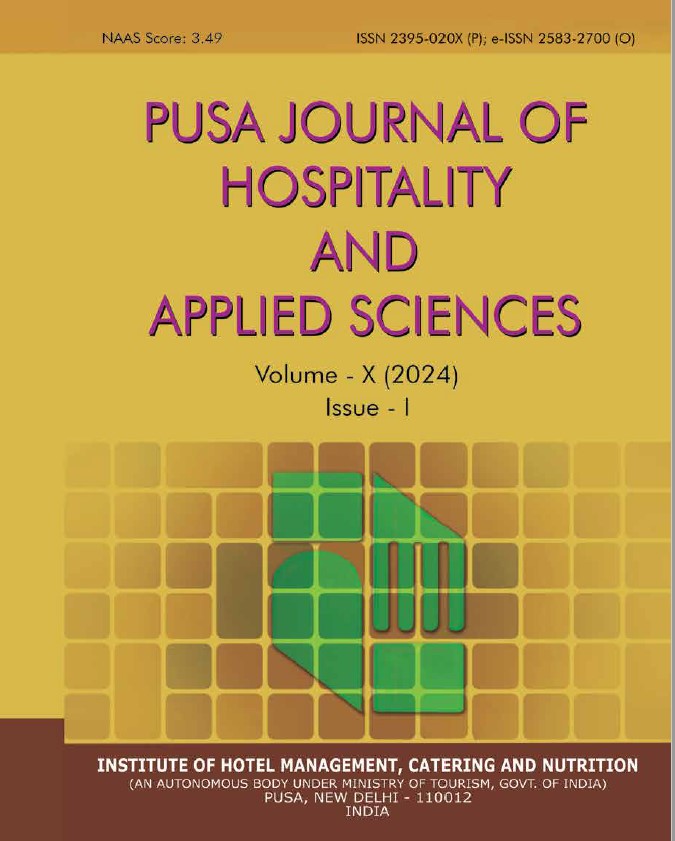Importance Of Research As A Subject In Hospitality Undergraduate Courses
Keywords:
Research, Researcher, Academic Importance, Personal and Social EnhancementAbstract
Background: Research is an important and essential part of any industry or institution. It helps in discovering new ground breaking facts about existing subjects and systems. Research is an important part of undergraduate curriculum. Objective: To understand the importance of research as a subject in hospitality under-graduate courses. Methodology: Data was collected by means of a questionnaire which was filled by the hospitality undergraduate students (n=200). Results: The findings of the study revealed that 76 % of respondents accepted that research is an important subject for undergraduate, 54% respondent accepted its benefits in skill developments. Among all respondents only 21% respondents showed interest in becoming researchers in future. Overall the students felt the importance of the subject. However, very few showed interest in pursuing research as a career. Conclusion: There is a need to sensitize students to increase the awareness and promote research not only as a subject but as a culture.
References
“About Us.”New York University – Faculty Resource Network.http://www.nyu.edu/frn/about.us/ 47 “Programs and Events.”New York University – Faculty Resource Network.
Bland, et al., Op. cit. [2] Hammond, S., Madsen, S., and Fenton, J. “Strategically Increasing Faculty Productivity.”Academic Exchange Quarterly, 8(4), 2004. Accessed at: http://rapidintellect.com/ AEQweb/5jun2821z4.ht
Carrero-Martinez, F. A. (2011). Rethink summer student research
Christopher R .Madan, University of Alberta, Braden D. Teitge, University of Alberta, The Benefits of Undergraduate Research: The Student’s Perspective (Pennsylvania state university (2013)
Daniel D. Denecke(2012), The Role of the Graduate School in Promoting and Enhancing
David A Gonzalvez (2013), The Benefits of Research in Undergraduate Education: Perspectives From a Teacher and a Student Oxford Dictionary(2012)
Desai, K. V., Gatson, S. N., Stiles, T. W., Stewart, R. H., Laine, G. A., and Quick, C. M. (2008). Integrating research and education at research-extensive universities with research-intensive communities. Advances in Physiology Education, 32, 136–141.
Dundar, H., and Lewis, D. R. “Determinants of Research Productivity in Higher Education.”Research in Higher Education, 39(6), 1998.p. 608.
Frantz, K. J., DeHaan, R. L., Demetrikopoulos, M. K., andCarruth, L. L. (2006). Routes to research for novice undergraduate neuroscientists. CBE Life Sciences Education, 5, 175–187.
Murdoch-Eaton, D., Drewery, S., Elton, S., Emmerson, C., Marshall, M., Smith, J. A., … Whittle, S. (2010). What do medical students understand by research and research skills? Identifying research opportunities within undergraduate projects.Medical Teacher, 32, e152–e160.
Narayanan, R. M. (1999). Use of objective-based undergraduate research project experience as a graduate student recruitment tool. Journal of Engineering Education, 88, 361–365.
Narayanan, R. M. (1999). Use of objective-based undergraduate research project experience as a graduate student
Reynolds, J., Smith, R., Moskovitz, C., andSayle, A. (2009). BIOTAP: A systematic approach to teaching scientific writing and evaluating undergraduate theses. BioScience, 59, 869–903.
Russell, S. H., Hancock, M. P., and McCullough, J. (2007).Benefits of undergraduate research experiences. Science, 316, 548–549.




